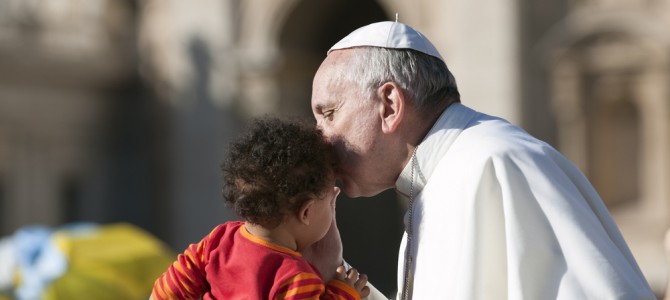
Pope Francis is once more on the frontier of controversy. Last week, the pope released “Amoris Laetitia” (The Joy of Love), which follows two years’ worth of synods on topics such as same-sex relationships and the status of divorced and remarried Catholics within the Catholic Church.
The synods were controversial enough in their own right and were divided between progressive and traditionalist factions. The progressives, for instance, in a proposal named after the German cardinal Walter Kasper, have favored allowing divorced and remarried (but not annulled) Catholics to receive the Eucharist, a practice the Catholic Church refuses to permit. The traditionalists have opposed such a proposal from the start.
The pope’s letter, however, has created enough ambiguity on the subject to cause consternation among traditionalist (conservative) Catholics opposed to relaxing the rules regarding reception of communion. Paragraph 305 and footnote 351 in particular are the source of the concern:
305.Because of forms of conditioning and mitigating factors, it is possible that in an objective situation of sin – which may not be subjectively culpable, or fully such – a person can be living in God’s grace, can love and can also grow in the life of grace and charity, while receiving the Church’s help to this end.351 Discernment must help to find possible ways of responding to God and growing in the midst of limits. By thinking that everything is black and white, we sometimes close off the way of grace and of growth, and discourage paths of sanctification which give glory to God. Let us remember that ‘a small step, in the midst of great human limitations, can be more pleasing to God than a life which appears outwardly in order, but moves through the day without confronting great difficulties’. The practical pastoral care of ministers and of communities must not fail to embrace this reality…
351.In certain cases, this can include the help of the sacraments. Hence, ‘I want to remind priests that the confessional must not be a torture chamber, but rather an encounter with the Lord’s mercy’… I would also point out that the Eucharist ‘is not a prize for the perfect, but a powerful medicine and nourishment for the weak’.
Of course, the pope doesn’t say divorced and remarried Catholics can receive communion — but he doesn’t quite deny it either. He picks a third path: proper discernment in grey situations can help people draw closer to God, and the church should be instrumental in that process in ways up to and including utilizing the sacraments of confession and the Eucharist. The deeper purpose of the paragraphs above, however, is to blur the line enough to provide cover to those pastors who were looking for an out to begin with and, now having it, can use it.
Conservative Catholics Take Umbrage
A faction within the church, as Claire Chretien explains here, “thinks one of the worst problems [the church] faces is people feeling excluded from church life because of their lifestyle choices. For example, because Catholicism teaches marriage is a lifelong union that can’t be undone, many people who are divorced and re-married aren’t permitted to receive Holy Communion, a sacred rite that’s central to the Catholic faith. This faction thinks their exclusion from this sacrament is an injustice.” This is true and this is obviously where the pope aligns in his letter.
A number of conservative commentators, such as Chretien, Michael Dougherty, Ross Douthat, and R.R. Reno have taken umbrage at the pope’s approach to Catholics in these situations, and it’s easy enough to see why: he’s taking a lot of not-so-insignificant liberties with longstanding Catholic traditions and teachings, in a way that reflects poorly on his office. It’s difficult to disagree with the criticism of “Amoris Laetitia” (especially R.R. Reno’s, which I encourage reading), but there are points I do disagree with, and others worth affirming.
In particular, Francis has ultimately been healthy for the church, even at the cost of frustrating traditionalist Catholics like Dougherty, Reno, Douthat, myself, and others. The emphasis he has placed on mercy — culminating in declaring a Holy Year of Mercy — has been beneficial to the church as well as disheartening; it is difficult, sometimes, to square mercy with justice, but the challenge of doing so can only help in the church in the long run.
Pope John Paul II and Benedict XVI both had remarkable pontificates, and while Francis’ has not been at that level the lens through which he views Christianity and Catholicism is at times (but not always) refreshing in a hierarchy dominated by like-minded traditionalists.
The Promise and Dangers of Mercy
That lens — of mercy, solidarity, and Christian love — also seems to be the Achilles heel of Francis’ pontificate. Francis obviously believes in the power of compassion and deep wells of mercy, and he thinks that with the right approach those virtues can reach people more effectively than a top-down approach that places a heavy emphasis on justice and punishment.
To an extent that’s true — the sacrament of confession for Catholics can be very powerful — but Francis seems to place a naive trust in people to avoid abusing the well of mercy the church provides. For example, in his recent letter Francis outlines a procedure regarding discernment for divorced and remarried couples so they better understand their status within the church:
300.For this discernment to happen, the following conditions must necessarily be present: humility, discretion and love for the Church and her teaching, in a sincere search for God’s will and a desire to make a more perfect response to it”. These attitudes are essential for avoiding the grave danger of misunderstandings, such as the notion that any priest can quickly grant ‘exceptions’, or that some people can obtain sacramental privileges in exchange for favours. When a responsible and tactful person, who does not presume to put his or her own desires ahead of the common good of the Church, meets with a pastor capable of acknowledging the seriousness of the matter before him, there can be no risk that a specific discernment may lead people to think that the Church maintains a double standard.
If those conditions are met it’s fair to assume a positive outcome will result. But the pope seems to have a naivety — or, perhaps, a disappointing motive — that conservatives don’t understand or otherwise hope isn’t true. Francis at once exhorts divorced and remarried Catholics to discern their situation carefully, while also saying the Eucharist “is not a prize for the perfect, but a powerful medicine and nourishment for the weak.” That’s fair on paper, but in practice people tend to follow the path of least resistance, which Francis has also provided through paragraph 305 and footnote 351. Reno gets to the heart of this frustrating contradiction:
He speaks of a church ‘in permanent mission,’ giving the impression that divine things are sacred only insofar as they’re useful in moving people toward missionary goals. In his ministry, everything must be available—in every situation. The sacred begins to merge with the useful.
Hence Francis’ insistence that Catholics take the high road, but his provision for an alternative anyway.
There are several conclusions to draw from this. First, and perhaps most important, Francis is at once healthy for Catholicism and an annoyance to traditionalists used to a friendly hierarchy. The pope hasn’t and won’t change Catholic dogma, at least if papal infallibility is to be believed. If anything, Francis is orienting the church in a more liberal direction, as Douthat speculates.
Secondly, “Amoris Laetitia,” like Francis himself, was needed and is disheartening. The emphasis the letter places on accepting (as opposed to ostracizing) divorced and remarried couples positively reinforces a practice that should already be happening.
But paragraph 305 and footnote 351, in particular, can only feel like a loss and a setback to Catholic traditionalists, who have been trying to hold back the flood of modernity and the sexual revolution since the 1960s and Vatican II. The pope’s under-the-table approval of a questionable (at best) or illicit (at worst) practice is upsetting and disconcerting. Nonetheless, the fact that this letter will have an impact across the Catholic Church can’t be understated.
Pope Francis and “Amoris Laetitia” are complicated — but so is Christianity. It’s worth the effort to try to understand all three.









